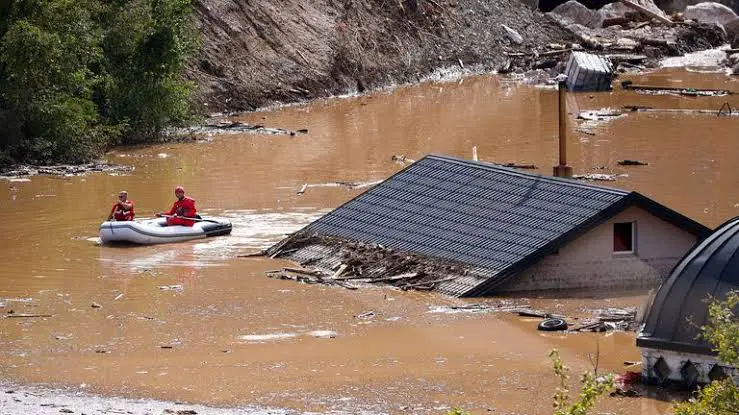At least 16 people were confirmed dead, and vast areas of southern Bosnia faced devastation after heavy rainfall triggered massive flooding and landslides, as authorities announced on Friday.

The storm, which followed a period of severe drought, caused rivers to overflow and massive landslides to destroy roads and homes, leaving the region in turmoil.
Bosnia's southern region, particularly the area surrounding the city of Mostar, was the hardest hit by this sudden deluge.
What made the flooding particularly catastrophic was the extreme drought Bosnia had experienced during the summer.
The intense heat had dried up the soil, leaving it incapable of absorbing the sudden torrential rain that followed.
Meteorologists noted that this was an unprecedented weather pattern, with one official calling it a "record-breaking event."
Civil protection services and emergency teams have been deployed throughout the region, but the damage is extensive.
In a statement, an official from Bosnia’s Federal Hydrometeorological Institute mentioned that “the combination of long droughts followed by heavy rains is a dangerous pattern we are increasingly seeing due to climate change.
The soil had no time to absorb the rain, and the water simply ran off, flooding everything in its path.”
Local authorities were swift in their response, setting up emergency shelters for displaced families, but the suddenness of the event caught many off-guard.
Several villages remain cut off due to landslides, with reports of people being trapped in their homes.
Roads leading to key towns have been destroyed, slowing down relief efforts.
Bosnia’s Minister of Security, Nenad Nešić, was quoted as saying, "This is one of the worst natural disasters we have faced in recent history.
“We are doing everything possible to ensure that emergency services reach the affected areas, but the scale of the disaster has made it challenging."
He added that military helicopters were being deployed to access hard-hit areas, but there was concern that the death toll could rise as rescuers made their way into remote locations.
This disaster underscores the growing concern over extreme weather events exacerbated by climate change, which has been widely discussed across the region.
Experts have been warning that the Balkans, which includes Bosnia, will experience more frequent and severe floods in the coming years as the planet warms.
One environmental activist in Sarajevo commented, "The combination of drought and flash floods is becoming more common.
“The earth dries out during summer, and when the rain finally comes, it causes destruction instead of relief.
“This needs to be addressed at a national level with better urban planning and flood management strategies."
Meteorologists forecast more rainfall in the coming days, exacerbating fears of additional flooding and landslides.
Local communities are on high alert, and evacuation plans are in place should conditions worsen.
The destruction of homes, infrastructure, and farmlands has left thousands of residents displaced and in need of assistance.
Many are without access to clean water and electricity, as the floodwaters have overwhelmed local power grids and water treatment plants.
A resident of one affected village shared her story with local news outlets: “We barely managed to escape.
“Our house is gone. Everything we had is underwater now, and we don’t know what to do next. There’s no food, no water, and no one can tell us when help will arrive.”
The Bosnian government has issued a public appeal for international assistance, urging neighboring countries and the international community to provide aid and resources.
The European Union has already pledged its support, with officials in Brussels expressing solidarity with Bosnia in the face of this disaster.
In the wake of this catastrophe, local and international climate experts are advocating for a reassessment of Bosnia’s disaster preparedness and infrastructure planning.
Floods have long been a threat to the country, but recent events have shown that the current system is ill-equipped to handle the growing intensity of such disasters.
Several projects have been proposed to improve flood management, including better drainage systems, reforestation efforts to prevent soil erosion, and reinforced infrastructure, particularly in rural areas.
The World Bank has been working with Bosnia on these issues for years, but much remains to be done.
Bosnia’s Prime Minister, Borjana Krišto, emphasized the need for long-term planning, stating, "We cannot continue to be reactive. We must anticipate these events and ensure our cities and villages are prepared.
“This is not just a one-time event but a warning of what’s to come if we do not take climate change seriously."
In addition to the immediate threat of more floods, Bosnia is now facing a growing humanitarian crisis.
Emergency aid is being rushed to affected areas, but relief organizations warn that food, water, and medical supplies are in short supply.
The Red Cross and other NGOs have set up emergency distribution points in the affected areas, but many people are still unreachable.
One volunteer said, "The situation is dire. People have lost everything, and we are doing our best to provide basic necessities, but the scale of this disaster is overwhelming.
“The lack of access to many villages due to landslides is our biggest challenge."
Bosnia faces a long and difficult road to recovery after the devastating floods and landslides that claimed at least 16 lives and displaced thousands more.
The challenge ahead will be twofold: addressing the immediate needs of those affected while also implementing long-term solutions to mitigate the effects of climate change and prevent future disasters.
As more rain is forecasted in the coming days, authorities remain on high alert, and residents in southern Bosnia brace for the possibility of more flooding.
The international community's response will be crucial in helping the country recover from this devastating event, but the lessons learned here may well apply to other regions facing similar climate-related challenges.
The tragic events in Bosnia serve as a reminder that extreme weather events are becoming more frequent and more severe due to climate change, and countries must act now to prepare for a future where such disasters are, unfortunately, more common.
